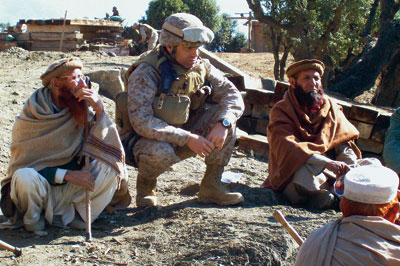Rush Filson '92
Take it from someone who knows: To win a war you’ve got to change lives, not just end them. “We can kill and capture as much as we want for as long as we want, but it’s not going to fundamentally change ideological views of extremists,” says Marine Maj. Rush Filson ’92.

Rush Filson '92 joins an impromptu shura (town meeting) held by the elders of Afghanistan's Korengal Valley during large-scale military operations last spring to oust al-Qaeda and Taliban operatives.
By 2001, Filson had been a Marine for about eight years. On the morning of Sept. 11, Filson was at work as a congressional policy officer in Quantico, Va. When Peter Goodrich ’89 died along with 64 others on Flight 175, which crashed into the World Trade Center’s south tower, Filson lost his best childhood buddy. “We pretty much did everything together,” Filson recalls of happy days growing up in Williamstown, Mass., with Goodrich.
Filson went from behind a desk to the front lines. By 2004, he was an infantry battalion operations officer on the ground in Afghanistan, planning and executing military actions in Logar province against Taliban and al-Qaida loyalists — the people who helped kill 2,973 people on Sept. 11. Still, he says, “avenging” is not the right word for his mission. “There was nothing personal about my encounters with the enemy” in Afghanistan. “My service over there was one of many ways to right a terrible wrong that affected so many people, Afghans and 9/11 victims alike.”
The Marines’ mission was also to provide medical and humanitarian assistance wherever they could. “I guess you can call it winning the hearts and minds,” Filson says.
One day, Filson met a teacher whose school was a mud-brick compound with three small rooms and a tiny tent-covered courtyard. There was no indoor plumbing or electricity and few school supplies for the 300 students, mostly girls. The teacher was conducting secular lessons despite death threats. “Extremists came into his house and threatened his life in front of his children: ‘We will kill you if you continue to teach these girls.’ He’d tell them, ‘I’m going to continue to teach.’”
This gave Filson pause. “That really struck me as incredible…. Just very profound.” So Filson e-mailed his parents back home in Williamstown. Rather than sweets or treats, he wrote, “what I need is school supplies.”
“You travel to other countries and kids walk up to Marines asking for candy and toys,” he says. “The children in Afghanistan ask for notebooks and pens. The conditions are so austere and so spartan and so uncomfortable, yet they still make an effort. They risk their lives to go to learn.”
A social-justice activist, Filson’s mother organized the donation of 10 boxes of school supplies from Berkshire Community College, where she was taking classes. She also forwarded her son’s e-mail to Sally Goodrich, Peter’s mother, with a note attached that said, “This is the real way to fight terrorism.”
Peter’s parents had founded the Peter M. Goodrich Foundation, www.goodrichfoundation.org, and through the foundation’s efforts and, eventually, gifts from more than 500 contributors, $180,000 was raised to build a 25-room school in Surkh Abat in Logar province, a few miles from the school Filson encountered.
“What’s going to fundamentally change [extremist] views is education and enlightenment,” Filson says. “But it’s going to take a few generations. And it has to be done with cultural sensitivity. It’s got to be consistent with Afghan traditions and culture and history.”
Filson, now stationed in Italy, has not been back to Logar. He’s not even sure if the teacher who inspired him is alive. He’s seen only photos of a satisfying achievement in the war on terror, one that started with a soldier’s age-old act: that letter home.
But that accomplishment, mingled with the memory of Peter Goodrich, lives large in Filson’s heart. “This is just me, but what better way to be a thorn in the side of all those individuals who plotted and schemed and executed 9/11 than to set up a secular center of learning right there in Afghanistan?” Filson asks.
“Helping, protecting, and bringing a renewed sense of enlightenment and respect to the Afghans, in the face of insurgent intimidation and religious extremism, does honor Pete’s memory and what he represented in terms of thought, compassion, and selflessness.”